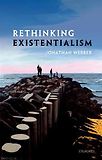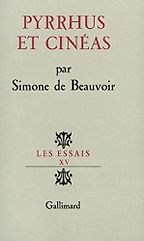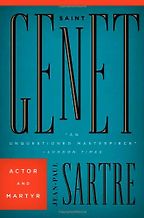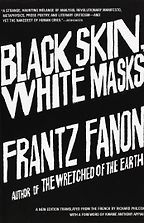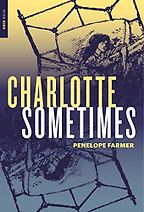The heyday – at least of French existentialism – was the period immediately after the Second World War. There was a lot of enthusiasm for it in the 1960s and 1970s in Britain, and then it fell by the wayside. In France it was actually vilified by many in the 1980s. Do you think it’s time to look back at existentialism and re-evaluate it?
Yes, I think certainly it is. You mention the vilification of existentialism in the eighties, and I think partly that was because people saw it as reflecting a very naïve, individual-centred perspective on the world, and a lot of the theoretical emphasis at the time was on social structures and linguistic structures. But I think in part that is a mischaracterisation of existentialism. We get given this cartoon-style history of European thought that says there’s a break with existentialism when structuralism and post-structuralism throw out the existentialist stuff and the emphasis on freedom and the emphasis on the individual. Really, it’s a much more fluid, continuous development. People like Michel Foucault and Jacques Derrida admitted that what happened when they were writing their first publications was that they had to emphasise their disagreements with existentialism, because existentialism ruled the roost and attacking it was the only way to get an audience. But what they downplayed was the continuities. I think now that people have spent a lot of time thinking about structuralism and post-structuralism and their relevance to society, it’s time to reboot those discussions and refresh them with a renewed focus on existentialism.
You’ve written a book called Rethinking Existentialism, which presumably paves the way for this. In order to re-think it, though, we must be clear what it is that we’re re-thinking. It’s a bit of a cruel question, but what do you think are the core tenets of existentialism?
Actually, I think there’s a straightforward answer to that, and I think it’s the answer that both Simone de Beauvoir and Jean-Paul Sartre gave in 1945, when they gave the word ‘existentialism’ its definition. It had only been coined shortly before and it was a media buzzword that meant just about anything. They gave it a definition and they defined it in terms of their own philosophy. It is the theory that existence precedes essence: the individual person doesn’t have a set, fixed personality, but instead develops a character depending on the projects they pursue and the social environment in which they pursue them. That’s the existential element of existentialism. It’s also the ethical theory that one ought to respect the structure of human existence, which means that one ought to value human freedom above everything else.
What’s being re-thought then, here? That’s a description of what existentialism is, where does the rethinking come in?
In two places. One is that not everybody agrees that that’s what existentialism is. The second is that there’s some development in that thought from 1945 up to about 1952, and that’s what’s tracked in my book. Not everyone agrees about the definition of existentialism because in 1945 both Sartre and Beauvoir were defining their view partly by referring to other philosophers and writers, like Kierkegaard, Heidegger, Dostoevsky. And so this continued when people started writing books about existentialism and compiling anthologies of existentialist writings: they then extended the word backwards in literary history and included all kinds of characters they decided had been existentialists or proto-existentialist. Once you start reading all those people side by side and you then ask yourself what existentialism is, what do all these people have in common, you find you can’t answer that question in a straightforward way since they don’t really have anything in common. So you end up with this idea that it’s just a family resemblance category. But that makes it a bit arbitrary. You can develop those kinds of family resemblance categories, you can draw those kinds of patterns in the history of thought until the cows come home, but it doesn’t necessarily mean that your pattern is really tracking anything.
You’re suggesting that it’s more appropriate to stick with Sartre and Beauvoir’s definition, and see it as a historical movement that emerged from that, rather than an emotional attitude with precedent going way back?
One way to do this is to distinguish existentialism from existential thought. The latter is any philosophy that tries to come up with a kind of systematic understanding of what it is to exist as a human individual; whereas existentialism is a particular theory that tries to answer that question. It is a substantive philosophical theory. There’s a lot to gain from that approach and I think that helps us to clarify a lot of what’s going on in Beauvoir and Sartre and other philosophers as well.
Although Beauvoir and Sartre gave the same sort of definition of existentialism in 1945, if you look closely they don’t actually agree with each other on what it meant. There’s an important difference between what Beauvoir meant by ‘existence precedes essence’ and what Sartre meant by it. Sartre famously believed in what he called ‘radical freedom’, which is the view that none of your character traits or values or projects, no part of your outlook carries any weight or inertia of its own: it’s only there because you continue to endorse and underwrite it, and you can just change that.
Beauvoir, in contrast, believes in ‘sedimentation’: she thinks that you become a particular kind of person through your upbringing and the projects you pursue, and although you can develop new projects to replace them, that’s not just an instantaneous radical conversion like you get in Sartre’s thought; rather, it’s a slow and difficult process, and the projects don’t necessarily disappear simply because you want to get rid of them. What happened over the course of the 1940s was that Sartre realised his view wasn’t going to work and that he needed to adopt Beauvoir’s view. By the time we get to his book Saint Genet in 1952, one of my choices, Sartre had dispensed with radical freedom and replaced it with the theory of sedimentation. So he rethought existentialism across that time.
It strikes me that existentialism as a movement was a catalyst for creative writing in many different genres. We know Sartre and Beauvoir were both prolific as philosophers, but also both reasonably prolific as novelists, playwrights, critics, and biographers. In some way existentialism liberated them to become writers in a variety of genres rather than exclusively academic philosophers. They were not constrained in any way by the definition of being a philosopher. I love this theme you’ve picked out, ‘underrated existentialist classics’. None of the five books you’ve selected is a straightforward philosophical tract.
Thanks. Yes. Several of them are pretty unusual pieces of writing full stop.
Let’s discuss Simone de Beauvoir’s When Things of the Spirit Come First (1979).
This is a slightly odd book because it’s not quite a novel and not quite a collection of short stories either. They’re five stories of varying lengths that centre around the same cluster of characters, but the narratives of those stories don’t necessarily fit together to create a single overarching novel. If you read it that way you encounter a lot of loose ends. She wrote it in the late 1930s and tried to get it published, but it was turned down by the publishers she sent it to and she gave up on it. She then found it forty years later in the late 1970s and thought it was worthy of publication, and so published it as it was. So it was certainly underrated by the publishers at the time it was written.
That seems to predate the formulation of existentialism proper. Is it even fair to call it ‘existentialist’ by your definition?
Good question. Well yes, I think it is. You can see in that work the important features of Beauvoir’s own philosophy that she develops in much more detail in the 1940s. Take the idea of sedimentation that I’ve already mentioned. These characters are all emerging from a very conservative, closed upbringing, which is also very spiritual in a Roman Catholic way, and they’re all dealing with the effects of that on their outlook of the world. Some characters still very much have those ideas, while others are trying to break away from it and develop their own perspective, but are finding that these elements of themselves are so sedimented that they are surprisingly difficult to budge and that this makes it harder for them to be the people they want to be. Most of these key characters are women as well, so the fact that their upbringing is the kind of upbringing that sediments them with a particular notion of femininity, but also a particular kind of spirituality, is important. Beauvoir later explains this at great length in The Second Sex.
Were you drawn to this book as an interesting work of fiction, or is it more that it effectively illustrates a philosophy?
It’s an interesting work of fiction in its own right. It gives us a really interesting insight into life growing up as a woman, or a man, in early twentieth-century France, a taste of French culture at that time. It gives you an insight into the way in which the roots of French existentialism grow out of, in part, this widespread theologically-orientated upbringing, a very spiritual kind of upbringing.
Is it spiritual rather than moral? From Beauvoir’s autobiography we see there were very high expectations put upon her as to how she should behave, what she should do with her life. For instance she was expected to marry and have children, not have a career as a public intellectual.
That’s right. But I think what comes out in this novel, at least with these characters, is that the moral expectations themselves have a spiritual sheen: they are at least presented as being led by spirituality – an idea I don’t think she’s very sympathetic to. I think she sees it as very constraining and problematic. Most of Beauvoir’s fiction, particularly from that era, consists of huge novels, and these can be quite a slow and difficult read; whereas this book is a great place to get a shorter introduction to her work.
Your second choice is also by Simone de Beauvoir: Pyrrhus and Cinéas (1944). So, who are Pyrrhus and Cinéas?
Pyrrhus is a king and Cinéas is his adviser. The book opens with a conversation between the two of them. Pyrrhus declares that he is going to conquer Greece, and Cinéas asks him, ‘Why? What are you going to do after that?’. To which Pyrrhus replies, ‘Well then I’ll conquer Africa.’ Cinéas asks again, ‘Well what are you going to do once you’ve done that?’ ‘Then I’m going to conquer Asia’, Pyrrhus replies. Cinéas keeps asking this same question until Pyrrhus runs out of lands to conquer, at which point he says, ‘After all this I will rest.’ Cinéas replies: ‘Well why not just rest now?’ Indeed. Why bother doing all those other things first?
“Cinéas replies, ‘Well why not just rest now?’ Indeed.”
There’s a lot going on in that conversation, but what Cinéas seems to be suggesting is that there’s something absurd about these projects, about all projects. You value the goal you’re trying to achieve while you’re trying to achieve it. But then once it’s been achieved you just move on to something else. So, that’s one of the problems Beauvoir wants to raise in the book: the problem of absurdity.
Absurdity not just for wannabe world leaders but for anybody, whatever project, whether it’s to write a book, get a job or have children? Is she saying that anything that you do is always going to be reduced to absurdity by the question ‘and then what?’
Exactly. But what Cinéas is wrong about, she thinks, is the suggestion that you could just give up committing to these projects, because on Beauvoir’s view you can’t. What it is to be human is to pursue projects. So that’s the problem of absurdity, as she sees it: we are stuck, we have projects and must value our goals, and yet are aware from some perspectives that these goals seem valueless.
Is this book another novel, or does it take a different form?
No, it’s a philosophical essay in the style of Michel de Montaigne’s Essais. It was originally published as a short book in 1944, but only translated into English in 2004.
Why do you think it hasn’t been discussed more, because it sounds fascinating?
It is fascinating. It strikes me as a much more insightful and interesting analysis of the problem of absurdity than Camus’ The Myth of Sisyphus which is the go-to text for that topic. It’s also an important moral argument: her analysis of absurdity produces an argument for Kantian morality, the idea that it’s imperative that you respect and promote human freedom. Her other moral and political writings of the 1940s, including The Second Sex, all are built on that claim. She’s often accused of simply assuming it without any argument, but she hasn’t assumed it, she’s published her argument in this book that was very well received in 1944 in Paris. I don’t know whether it then disappeared in French culture or just never got translated into English. I think the reception of all her moral and political work, certainly in the English language, has been distorted by that crucial missing piece of the jigsaw.
The Second Sex is the philosophical work that Beauvoir is known for. She’s almost always portrayed as a feminist philosopher, less often as an existentialist, except in relation to Sartre and her famous relationship with him and to the themes of the novels. It seems that Sartre took the limelight, and everyone gravitated towards his version of existentialism. But from what you’ve been saying Beauvoir sounds a lot saner. For me, Sartre’s existentialism is attractive and empowering in some ways, but philosophically naïve by contemporary standards when it comes to the extent of human freedom he assumes and the ease with which he thinks one can move from deciding to be something else to becoming something else. It seems to be splitting away from history, and the complexity of people’s obligations and networks of commitments. Whereas for Beauvoir that’s always the issue: this awareness of the things that are holding you back as well as those that push you away and forward.
I think that’s right. But the contrast between them has even got to the point where some people think that, because of exactly the contrast you’ve described, and because people think existentialism has to be defined in terms of Sartre’s philosophy, that it somehow shows that Beauvoir was not fully an existentialist. But I think it’s exactly the other way around. If you define existentialism as what they were both saying in 1945, then you see this as a tension within existentialism, one that got resolved in Beauvoir’s favour across the 1940s.
You’re interested in rethinking existentialism. How do you view existentialism, even of Beauvoir’s kind, in the light of recent neuroscience which seems to be constantly moving in the direction of showing us that the stories we tell ourselves about choice are mostly confabulations rather than accurate descriptions of our powers to do things differently?
I’m not sure that is what neuroscience is necessarily telling us, and a certain take on it often overlooks this. The neuroscience story isn’t that what appear to be our decisions are completely epiphenomenal, it’s not that they have no effect, it’s that their effect isn’t directly on our immediate behaviour but rather it’s on training and programming the system that produces our behaviour. I think this is exactly what you find in Beauvoir’s style of existentialism based on her notion of sedimentation.
I managed to study existentialism without ever even encountering that word ‘sedimentation’. Studying it at university in the 1980s ‘sedimentation’ was not a word that came up in the seminars I attended. Sartre’s discussions of the ‘slimy’ and the ‘viscous’ were mentioned as glue-like things holding us back, ‘the revenge of the in-itself’, but never ‘sedimentation.’
Sartre’s whole model doesn’t make sense without a notion of sedimentation. Why might ‘slimy’ things be disgusting because they conflict with your projects, unless it’s because your projects have become so engrained in your cognitive system that they are even shaping your perception. It looks like sedimentation is required for a lot of Sartre’s existentialism. That’s why I think it’s a mistake to think that existentialism is just the theory of radical freedom and that Beauvoir’s theory is not really existentialist. The radical freedom version of Sartre in 1943 was not even internally coherent for that reason, and that’s ultimately what he came to realise over the 1940s.
Your next choice is Jean-Paul Sartre’s Saint Genet: Actor and Martyr (1952). Jean Genet was a fascinating character, a professional thief who served time in prison, a brilliant novelist and also a highly-regarded poet and playwright, openly homosexual at a time when that was an incredibly difficult thing to be. Why does Sartre call him a saint?
It is a reference to the third-century martyr Saint Genestus, the patron saint of actors, who is known in French as Genêt. He was supposedly an actor who converted to Christianity on stage during a play that mocked Christian rituals. Sartre is drawing parallels between the life of Genet and the mythology surrounding this saint. He’s not necessarily holding Genet up as a hero.
The book does seem to give a lot of internal details of Genet’s life. It’s a biography, but written by an existentialist who has a particular theory about the nature of understanding one’s life, and Sartre seems to be imagining that all from Genet’s viewpoint.
I have to admit this is one of the strangest books I’ve ever read. It’s a biography, as you say, of Genet, who was quite famous at the time as a novelist, a playwright, and a poet. But he wasn’t hugely famous. Sartre had been asked to write a preface to a collected works of Genet, and what he ended up writing was a 700-page psychoanalytic tome.
It’s more existential psychoanalytic than Freudian psychoanalytic, isn’t it? Sartre didn’t believe in the subconscious, which a conventional psychoanalyst would consider something of an omission.
He didn’t believe in the particular Freudian structure of the mind, but he did think that a lot of what Freud described about patterns of behaviour was correct. He just thought Freud had developed the wrong theory of the mind to account for it. In fact, he thought Freud’s theory of mind failed to explain it.
For Sartre, there is a kind of Original Choice a defining choice that each of us makes that goes on to shape our future choices. Right at the heart of this book Sartre talks about Genet’s choice to be a thief, a choice he made in childhood.
That’s right. He was trying to present an analysis of Genet’s life and all the details of it as if in the first person. But on the other hand, he does sometimes describe the book as a true novel. There are various places in it where he describes some event, and you’re reading it thinking, ‘how could you possibly know this event took place like this when Genet was ten years old?’ And then Sartre quite disarmingly writes ‘oh, well maybe it didn’t happen exactly like that, but something like this happened.’
He did talk to Genet and studied his writings, which were strongly autobiographical. But to some extent what he was doing with Saint Genet was not just presenting a biography of a particular person, but rather showing how a whole person, with all of their tastes and mannerisms and works, can actually be a manifestation of a single underlying project. In a way, it’s a description of a possible person, a description of how the theory can be coherent and give a story about a person. In that way it doesn’t matter whether it’s actually true about Genet; that’s what I think he means when he deflects with those disarming comments.
He does employ the apparatus of existential vocabulary: the book includes many reflections on self-understanding and bad faith and how individuals act in relation to other people’s versions of themselves. It strikes me that in some ways Saint Genet provides an easier access to the themes of Being and Nothingness than Being and Nothingness itself.
That’s certainly right. It’s a much more lucid piece of writing. Some passages in Being and Nothingness are great, but some of them are absolutely tortuous. In many respects, what he’s doing in Saint Genet is rethinking the existentialism of Being and Nothingness because he has abandoned the idea of radical freedom because he’s been persuaded finally that Beauvoir is right about sedimentation. That’s why he cites The Second Sex a few times in Saint Genet. It’s also the first time really that he’s paid much attention to childhood: there is a lot about Genet’s formation throughout his childhood; whereas in Being and Nothingness it’s as though we simply appear out of nowhere as fully formed adults.
Obviously later he wrote The Words which is a short autobiography. He won the Nobel Prize for Literature for that, but went on to reject the prize. So, he did later devote time to thinking about childhood and in particular his own childhood…
Just before we go on to your penultimate book choice, I want to ask why anyone should read Saint Genet?
It’s probably the definitive statement of Sartre’s existentialism. His existentialism developed until this point, because of the tensions between radical freedom and sedimentation that we’ve discussed. Once he had finally accepted the theory of sedimentation, he didn’t want to throw out his existing existentialism, but could see that this alteration in the metaphysical theory had far-reaching ramifications. So, this is all thoroughly rethought throughout Saint Genet. The book also weaves together various threads he’d been working on in the previous decade. The work on imagination in particular, and the way it developed in Genet’s own aesthetic sensibilities, the way it came out in his poetry and prose – these were all things Sartre had talked about in different ways, but he had never tried to coalesce them all into a single picture before.
I wonder whether the reason this book isn’t better known, even today, is partly to do with homophobia? Certainly, when I read it in the 1980s, I had to buy it in Gay’s the Word bookshop in Bloomsbury: it wasn’t on the standard bookshelves then, you didn’t see it in bookshops then in those pre-Amazon days.
That may well be true, although to be honest there might be other reasons why it wasn’t mainstream. It is just such an odd book. You wouldn’t necessarily intuitively think that some great philosopher’s definitive work might be found in the biography of a playwright and poet. Admittedly Being and Nothingness is a strange book too, although that’s strange in a way that’s fairly familiar from the history of philosophy.
Your fourth book choice is Frantz Fanon’s Black Skin, White Masks (1952). Could you say a little bit about who Fanon was?
Fanon was a psychiatrist by training. In fact, he originally wrote Black Skin, White Masks as his final-year dissertation for his medical degree, but was promptly told by his supervisor that there was no way he would pass with a paper like that. So he wrote something different on neuropharmacology for that instead. He was black, and was born and raised in Martinique, which was a French colony that then became a département of France. He fought for the French forces in the Second World War and in recognition of his service in the war he was awarded a scholarship to the University of Lyon where he trained to be a psychiatrist. He’s especially well known for his second book, The Wretched of the Earth, which came out in 1961 and is a central text in anti-colonial political thought. But his first book doesn’t take the same kind of political perspective. Rather it focuses on the individual person. It was very much influenced by existentialism as a movement, and was published in the same year as Saint Genet. Fanon was particularly interested in the psychiatric problems you could face if you were a victim of racism, particularly of anti-black racism in France. This book is often misunderstood, I think, and its existentialism is usually completely overlooked.
Interesting. So, obviously it’s recognised as a classic, in the way some of your other choices aren’t, but it’s not necessarily recognised as an existentialist classic. What is it that makes the book existentialist: its influences, or its focus on the subjectivity of people’s experience?
Both of those things are important features of its existentialism. What he develops is an existentialist view, that existence precedes essence, that people don’t have fixed personalities. It follows that there are no ethnic natures, or essences of particular groups of people, and that anything that might appear to be this way is therefore the result of social construction. That operates, in his view, through a kind of sedimentation of the idea that there are different races of people with different fixed natures. Fanon places a lot of emphasis on childhood and upbringing here, so there’s a strong similarity between Black Skin, White Masks and The Second Sex in that regard. The underlying theory of the whole book does seem to be that same kind of existentialism you get in Beauvoir’s work from the late 1930s onwards and in Sartre’s work from Saint Genet onwards.
Five Books interviews are expensive to produce. If you're enjoying this interview, please support us by donating a small amount.
Each chapter in the book develops work of a different kind of analysis: he has some literary criticism, some historical analysis, some psychoanalytic and political theory, followed by short chapters on Hegel and Adler. So, it’s often been seen as quite an eclectic work that’s trying to address racism in a number of ways but doesn’t really have any theoretical unity to it. Some people think that’s the point of the book, that there is no correct single way to address these problems; but I think that’s mistaken, that what he’s doing consistently throughout the book is developing this existentialist viewpoint of the sedimentation of a social racism into the outlook of the individual.
And is it a relatively easy read, or not?
Again, it’s quite an odd book. He changes literary register all the time, and he’s drawing on a wide range of intellectual sources, both academic ones in psychology, history and anthropology, and literary sources, novelists, poets and musicians. And he’s not only drawing on those influences, but also switching between those literary registers himself. So, some of it is quite autobiographical and confessional, almost meditative. Much of it is objective and forensic. So it can be a challenging read, trying to keep up with him as he keeps shifting gears.
Like Saint Genet it’s not a conventional book then. There’s a sense in which existentialists are sometimes genre-rejecters, almost as though it’s considered a form of bad faith to accept that there is one way to write a book.
I think that’s definitely what’s going on with Black Skin, White Masks. The actual writing of the text is a kind of performance of the theory itself. So, who is Frantz Fanon, the author? Well, he’s the person who has all these influences and whose outlook is developed through all this sedimentation, and when he expresses himself authentically, as the person that he is, he must express himself in these different registers and draw on all these influences, because otherwise it’s only a partial presentation of his thought and his voice.
The final book you’ve chosen is Charlotte Sometimes, by Penelope Farmer. Could you tell me a little bit about Farmer?
She’s written a number of novels, mostly children’s novels, but this is the one that she’s best known for. This is partly because it is the title of The Cure’s sixth single, which is a take on the story in this book. To call this an underrated existentialist classic might be a little bit of a stretch, because I don’t think that it is presenting a theory, or the theory that existence precedes essence, or anything like that. But it is a meditation on the kinds of questions, and the kinds of reasons, why people might come to that theory.
Without giving too much away, can you give us a sense of what happens in the book, or at least a flavour of it?
I’m reluctant to give anything away. The book was first published in 1969, but was set in 1958 and 1918, moving between the end of the First World War and a period forty years later. The central character, Charlotte Makepeace, comes to understand the role of her social setting and the temporal sequence of her life in forming who she is, in a way that wouldn’t have been obvious to her, had she not been through the adventures that she’s gone through.
Do you think it was actually influenced by existentialism, or is that just coincidental?
I don’t know. There was a lot of literature around at the time that was influenced by existentialism in various ways, though it tended to have been influenced by the Camus model of a lone alienated figure rather than this socially-embedded existentialism that you get in the works of Beauvoir. I have read an interview with the author where she says she was surprised that a lot of people consider it a book about identity, because that’s not what she had in mind when she was writing it. But I’m not sure really what that amounts to, because people mean different things by ‘identity’. I think it’s clearly a meditation on what makes a person who they are, the historical contingencies of that, the people you’re around, the larger historical context, and the navigation of all that is available to you at your particular stage of life. As I mentioned, one part of the story is at the end of the First World War, a major shock to European culture, and then the other part of the novel is 40 years later. Not only is the First World War well and truly over, but we’ve seen its ramifications in the Second World War as well by then.
And you’re recommending this book as a book for adults? Or do you just think that it’s a good children’s book?
I would recommend it for adults, yes. I think I would recommend it as a children’s book as well. Perhaps it sounds a little sophisticated, but the lead character is ten years old and the story is told entirely from her perspective. The way in which a reading of this book might cause you to come to question your own identity, and see your personality as a reflection of the contingencies of your background and upbringing, is perhaps the kind of realisation you wouldn’t want children to have too early in their lives. But it is certainly something to recommend to teenagers.
Get the weekly Five Books newsletter
In a way that seems to be the theme of all of these books. I guess that is the big existentialist theme, that you read these books and they have the potential to change how you understand yourself. Saint Genet isn’t just about Genet, it’s about any human being, how a human being is shaped; and Fanon’s book isn’t just about those with black skin.
Yes. It’s about the construction of race itself.
Sarah Bakewell’s book At The Existentialist Café has brought existentialism back into the literary public’s awareness in a positive way recently, not as something to get beyond as it were, but as a movement which had really significant things to say about every human being. Are you sympathetic with that view? Obviously, you’ve devoted a lot of time to studying existentialism and are recommending existentialist books. Is it because these books shed light on existentialism, or is it because they shed light on what is it to be human to some extent?
It’s the latter for sure. One of the reasons why people are becoming interested again in existentialism is that there’s been a resurgence of interest in identity and in the origins of identity, especially gender and racial identity. This is why there’s a resurgence of interest in Beauvoir and Fanon. I absolutely think their analyses of the way sedimentation occurs, and of the prospects for a person moving away from a sedimented outlook, speak very directly to contemporary concerns. The other books I’ve recommended are relevant to these concerns too, just less directly.
Five Books aims to keep its book recommendations and interviews up to date. If you are the interviewee and would like to update your choice of books (or even just what you say about them) please email us at [email protected]

